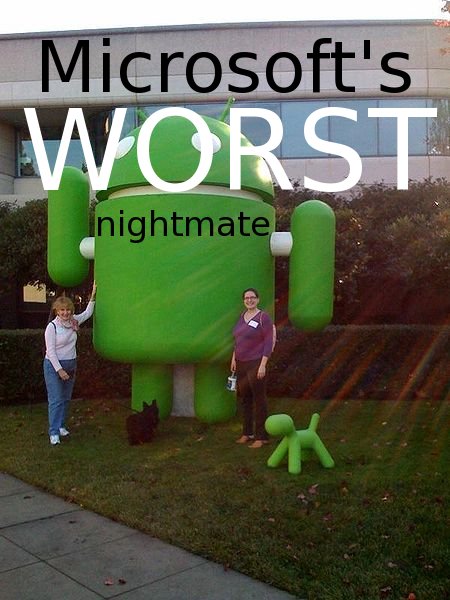08.09.10
Links 9/8/2010: $149 Android Tablet, Linux a Winner
![]()
Contents
GNU/Linux
-
Throwing down the gauntlet
Recently I have had a lot of people comment (on this forum and other forums) that Linux isn’t user friendly, that Linux will never make it to the average user’s desktop, that “Windows rulez and Linux droolz”. Among most of those detractors hardly a one will offer a solid reason to back up their statement. So this time I am throwing down the gauntlet of challenge to say “prove to me that Linux is not user friendly”.
-
Linux is winning
Linux doesn’t have a CEO. Consequently, there’s no annual keynote hosted by a charismatic alpha male. But if it did, and if there were a conference covering the first half of this year, the first speech would start with three words: “Linux is winning”.
-
Desktop
-
Some Notes on Linux Effects
One of the many attractive features of Linux is the possibility to add beautiful effects to the desktop. Compiz provides the best known set of effects and they can be used both in Gnome and KDE distros. You get this set by installing it from the distribution repositories. However, KDE has its native effects, which are also nice although a bit stiffer: Kwin. (This is Kwin’s flipswitch, an application switcher effect that is is also seen in Compiz and in Windows Vista)
[...]
Some people consider effects a waste of computer power. They may be right but, in my modest opinion, the cube, the multiple wallpapers, fire-writing, water, and snow make my computer environment more appealing to me. I find this aspect significant because, believe it or not, those pieces of eye candy become quite relaxing when you are trying to write an article on, say, Japanese acceptance/rejection ambivalent syndrome or the dark night of the soul in T.S. Eliot’s Four Quartets and the muses decide to hide from you. Plus, when the poor souls trapped in Windows 7 Starter see me enjoying my writer’s block by playing with the desktop effects, they always ask themselves why I get so many cool features for free and they have to pay to be able to use the over-rated Aeroshake.
-
Internet Hipster-ism
One of my friends made a offhanded comment about me being an “internet hipster”. Well, and that got me thinking. Well, I don’t think
that I’m that abnormal from my peers, so perhaps it’s time to look at how the collective “us” are conducting ourselves. The more I thought about
it, the more I got myself thinking that the GNU/Linux community is the “Hipster” sub-culture of computing. Seems a bit backwards, after all, most
of the actual hipsters use Apple products.
-
-
Kernel Space
-
The saga of Git: Lightning does strike twice
Every now and then, a shiver runs through the Linux community as people realise afresh that the entire edifice has a single point of failure: Linus Torvalds. These episodes usually manifest themselves as concerns about the scalability of said individual – whether he can continue to oversee and manage the amazing distributed development model as it grows ever bigger and more ambitious. To counter those fears it is probably worth looking at what happened as a result of the first – and by far the most frightening – “Linus does not scale” episode, not least because it led to multiple positive outcomes.
-
-
Applications
-
A Better CD Encoder frontend command-line utility (actually, a shell script) that grabs tracks off a CD.
-
Xara – Photo & Graphic Designer v6 review
There is other dedicated software around that can offer superior facilities in the separate fields of photo editing, web page design and desk-top publishing, but nothing that offers all this functionality in a single program. But because it is so detailed, new users may experience a steeper learning curve.
-
Instructionals/Technical
-
Use Top Shelf to keep track of what you are working on
-
Giving a fresh Ubuntu install more power
-
Transform your Ubuntu Box into a Karaoke Machine
-
How to Play StarCraft 2 on Linux WINE
-
3 ways to get Linux release information from bash terminal
-
How to hide a file or folder in Linux
-
How to Customize the GDM Sessions List
-
Testing if a file system can be used for home directories…
-
-
-
Desktop Environments
-
LXDE
-
Still more LXDE desktops
I keep running into LXDE derivatives. Not physically of course, but it could be an unintended side effect of being on the lookout for distros to try on the Mebius.
-
-
-
Distributions
-
PCLinuxOS/Mandrake/Mandriva Family
-
Upgrading Mandriva Linux 2010 to Mandriva Linux 2010 Spring
One lesson I learned from this, something that was brought up in one of the comments in Manual LVM configuration on Fedora 13, is that if you are going to create a separate partition for /boot and you are going to run the system through several update/upgrade cycles, be very generous with disk space allocation – to /boot.
-
-
Red Hat Family
-
Fedora
-
Switching from Gentoo to Fedora
Round about last week, I switched my desktop from Gentoo to Fedora. It took a few days to get everything the way I wanted. But it only took that long because I had lots of data to backup and (selectively) restore, and I only worked in the evenings. Fortunately, a “re-install” is way less painful than Windows, since all you really need to keep is your home directory. I just don’t know how Windows users live through it, especially without all their programs in a convenient package manager. I can happily say I have never re-formatted Windows for any reason (and that’s not because I don’t used it).
-
-
-
Debian Family
-
[Debian Developers per country]
-
Canonical/Ubuntu
-
OMG! Ignorant!
So, Benjamin Humphrey of OMG! Ubuntu! and Ubuntu Manual team lead has a blog post he considers so brilliant he made sure it went out twice: “Dude, you’re a 35 year old with a neck beard“.
Mr. Humphrey’s particular post is so chock-full of ignorance that it deserves a proper dissection.
Let’s begin!
Step One: Mischaracterize and dehumanize the opposition
Mr. Humphrey leads off with the old tried-and-true one-two punch of the anti-Free Software crowd: first, stereotype your opposition and second, blame them alone for all failings.
Stereotype. “Extremist diehard Linux geeks” – according to Mr. Humphries – refer to Linux as “GNU/Linux”, use the terminal window, and only exercise once a year by walking their dog.
-
First Ubuntu UK Geeknic a Success
-
Flavours and Variants
-
Jolicloud: Free Cloud-based Netbook OS
Version 1.0 of the operating system incorporates a user interface built with HTML5 that includes an application launcher, a library of compatible applications with one-click installation and removal, a display of all machines associated with user account, and a social activity stream that enables users to compare installed applications
-
Jolicloud 1.0 (robby) – Very Mixed Feelings
I spent the past week installing and testing Jolicloud 1.0 on two of my systems – one “real” netbook, the HP 2133 Mini-Note, SVGA 1024×600 model, and one “oversize” netbook, the HP Pavillion dv2-1010ez. The results have been mixed, to put it mildly. I think that I see what they are doing, and where they are going with this. It is a very, VERY web-centric / cloud-based operating system, not only at the level of the applications such as Facebook et. al., but at the level of the operating system itself. That kind of operating system is not for me, on both levels. I don’t use “social networking” applications at all, period. I don’t want my computer(s) to be tied to, dependent upon, or constantly exchanging information with the “cloud”, period. But I am old, and my feelings and computer use patterns are probably not typical these days – perhaps even more so in the case of netbooks.
-
-
-
-
-
Devices/Embedded
-
[Ben Nanonote] Pure fun, but not for the faint hearted
I must admit I’ve been very frustrated at times. And sometimes, I still am. But there is something about this tiny machine that makes you love it, no matter what. It’s very sturdy, although a foot has fallen off and I reconnected the rubber USB protection several times. I reset it, yanked the battery out of it, reinserted the mini-SD card time and time again, but it kept on working. The power button has been abused a zillion times, but it doesn’t give up. It’s really a brave little machine.
-
Phones
-
Android
-
Report: Android coming on strong in race against iPhone and Blackberry
The researchers found that 27% of people who bought a smartphone over the six months ending in June went with Android vs. 23% for iPhone. That put Android in second place, behind Blackberry with 33%.
That’s a big change from Nielsen’s previous tally for the six months that ended in March. At that point, 36% of smartphone buyers went with Blackberry, 27% got iPhones, and just 17% allied with Android.
-
-
-
Tablets
-
Welcome: $35 tablet for education
One Laptop per Child applauds Minister Kapil Sibal for promoting a $35 tablet. Education is the primary solution to eliminating poverty, saving the environment and creating world peace. Access to a connected laptop or tablet is the fastest way to enable universal learning. We agree with you completely.
Please consider this open letter OLPC’s pledge to provide India with free and open access to all of our technology, and our experience with 2 million laptops, in over 40 countries, in over 25 languages. As a humanitarian and charitable organization, we do not compete. We collaborate, and invite you to do so, too.
-
Attention Kmart shoppers: $149 Android tablet on aisle 5
The Android OS isn’t just powering high end smartphones, it also runs barebones tablets sold at Kmart for the price of an iPod nano.
-
-
Free Software/Open Source
-
Greenstone experiences in Latin America and Caribbean
The open source Greenstone digital library software suite was developed by the University of Waikato in New Zealand, in cooperation with UNESCO and the Belgian NGO Human Info. Greenstone is a user-friendly, multilingual, multi-platform package for assembling electronic documents into digital collections and for publishing these collections on the web or on CD-ROM. It accepts documents in a wide range of proprietary and standard formats, supports numerous standards for document and metadata exchange.
Since its creation in 1997, Greenstone software has spread to 90 countries and has been translated into 45 languages, which makes it a key tool for the development of knowledge societies and a promoter of social development at the international level. Greenstone is being distributed under GNU General Public License.
-
Open Source and Economics: How the Hold Up Problem Explains the Flash Wars
The hold up problem is particularly severe in the IT sector. Building an Internet company on a foundation consisting of proprietary software owned by others is akin to building a house without owning the land under it. When software is sold in binary form, the buyer is subject to hold up by the vendor; if the software needs to be changed in the future, such changes can only be done with the cooperation of the original vendor at the price that the original vendor demands. By relying on open source, a company can invest in developing its product without fear of being held up down the road. Therefore, open source is an economically powerful solution to the hold up problem.
-
Lightspark Gains Faster Rendering, H263/MP3 Video
Lightspark, one of the newest free software projects designed to provide an open-source implementation of Adobe’s Flash/SWF specification, has been progressing at a rather expedited pace. Lightspark continues to pickup new features with each new release, which as of late have been occurring frequently. Less than a month ago, Lightspark 0.4.2 was released and version 0.4.3 is already approaching with the first release candidate having been released this weekend.
-
Top best free software
There is a lot of free software available and much of it rivals the quality of software that you have to pay good money for. Here is a list, in no particular order, of some of the best software currently available for free.
-
Why can’t free software lead to hardware innovation?
Next thing we know, along come a host of similar devices, many of them based upon Android which is free software, even if it is often locked down by the hardware manufacturers. It’s a similar tale with tablets, how many rumours of “Linux based” iPad wannabes do we have to endure before we actually see one?
-
Web Browsers
-
Mozilla
-
Mozilla Summit 2010 and dev culture
Never has this been more apparent to me than at the 2010 Mozilla Summit. I couldn’t help but notice that every session I visited, every reception I attended, and every conversation I had was dominated by male hacker stereotypes. The game room was full of obscure board games, first person shooters, caffeine and candy. Group conversations inevitably drifted towards the finer details of an API or a technical discussion of the merits of one platform or another. I had many short-lived and terse conversations with shy and introverted but incredibly proud geeks like myself.
-
-
-
CMS
-
Hieroglyph Plugin for WordPress
The idea of a plugin is that it can be added to any WordPress site and I will release it as open source code when it is finished. It is still in alpha development and I expect it will be several months before the plugin is ready for public release via the WordPress repository. It is also a very big plugin with a couple of thousand files and will probably be 20Mb or more when it is finished.
-
-
Openness/Sharing
-
Links ‘n’ Thoughts on emerging science blogging networks
-
Open Data
-
Too Many Researchers Are Reluctant to Share Their Data
A new model of data sharing and openness is emerging in the scientific community that replaces traditional ways of thinking about research findings as the private property of the primary investigator. Large granting agencies, including the National Science Foundation and the National Institutes of Health, have embraced the new model of more-open access to research data. Later this year, the NSF will start requiring scientists seeking research grants to include a data-management plan in their applications, describing how and when their data will be shared.
-
Bermuda’s Legacy: Policy, Timing and the Genome Commons
Although the open availability of scientific data is fundamental to the modern scientific enterprise, the sharing of data has not always been accomplished with the speed or regularity that traditional norms of scientific conduct would dictate. A group of scientists and policy-makers met in 1996 to develop principles for rapid pre-publication release of genomic data to enable better coordination of the massive human genome project and to accelerate the progress of science in general. The resulting Bermuda Principles, requiring the release of all genomic sequence data to public databases within twenty-four hours after generation, were revolutionary in their scope and lasting in their effect.
-
-
Leftovers
-
Network admin Terry Childs gets 4-year sentence
Childs defended his actions during a long court trial, saying that he was only doing his job, and that his supervisor, Department of Technology and Information Services Chief Operations Officer Richard Robinson, was unqualified to have access to the passwords. Childs eventually handed over the passwords to San Francisco Mayor Gavin Newsom.
-
Is Ushahidi a Liberation Technology?
Larry recently set up the Program on Liberation Technology at Stanford University together with colleagues Joshua Cohen and Terry Winograd to catalyze more rigorous, applied research on the role of technology in repressive environments—both in terms of liberation and repression. This explains why I’ll be joining the group as a Visiting Fellow this year. The program focuses on the core questions I’m exploring in my dissertation research and ties in technologies like Ushahidi which I’m directly working on.
-
Books
-
Books: The vinyl record of the publishing business.
There has been a lot of talk, lately, about the death of books due to the e-reader market. While I firmly believe that book sales are going to take a staggering loss, I’m fairly certain that we’re not ready for the eulogy. The saviors of paper and ink publishing will come in two forms: the purists and the poorest.
-
Nicholas Negroponte: The Physical Book Is Dead In 5 Years
By “dead,” he of course doesn’t mean completely dead. But he means that digital books are going to replace physical books as the dominant form. His argument is related to his One Laptop per Child Foundation. On those laptops, he can include hundreds or thousands of books. If you think about trying to ship that many physical books to the emerging world for each child, it would be impossible, he reasons.
-
-
Science
-
The Internet Generation Prefers the Real World
Jetlir is a high school student from Cologne. He could easily be a character in one of the many newspaper stories about the “Internet generation” that is allegedly in grave danger of losing itself in the virtual world.
-
-
Health
-
The Struggle Behind the Scenes Over Health Care Reform
Big insurers are struggling for the freedom to keep spending less and less on medical care, because every dollar they don’t spend on medical claims means more dollars paid to shareholders and CEOs. Insurance companies are pulling out all the stops, Wendell says, including trying to manipulate the very definition of the term “medical care.” They are pressuring the NAIC to let them shift a lot of what the companies now count as administrative expenses into their “medical expense” category. If that happens, the insurance companies will look like they’re spending more on medical care, without really changing any thing at all, and that meets their goal of assuring no real change occurs at all.
-
-
Security/Aggression
-
Video: police officers filmed smashing up pensioner’s car
Footage captured on a police dashboard camera shows one officer striking the driver’s seat window with a baton up to 15 times and another officer jumping on the bonnet of the car and kicking the windscreen in an apparent attempt to crack it.
Police pulled over Robert Whatley, 70, for not wearing a seat belt as he drove through country lanes in South Wales. The 8-mile chase started after officers tried to give Mr Whatley a fixed penalty notice but he drove off.
-
-
Environment/Energy/Wildlife
-
Quebec couple wins right to complain about landfill
The lawsuit was filed against Serge Galipeau and his wife Christine Landry, of Cantley, Que., just north of Ottawa, after they complained about the smell of hydrogen sulphide gas emanating from the landfill.
Justice Pierre Dallaire ruled that the $1.25-million defamation suit, if allowed, would interfere with the public’s right to free speech.
-
EXCLUSIVE: Sandra Bullock Disowns BP-Backed Greenwashing Campaign
Academy Award-winning actress and New Orleans resident Sandra Bullock has severed her involvement in a campaign to call attention to the BP spill, after learning from ThinkProgress that it was a greenwashing effort by the oil industry. Bullock is prominently featured in the Restore the Gulf campaign, run by Women of the Storm and sponsored by America’s Wetland Foundation.
-
Everything’s Okay in the Gulf — Or Is It?
Suddenly BP’s oil disaster is getting an unusually high amount of positive publicity. Media reports are concluding that most of the oil has disappeared. The static kill has been successful at holding back the oil pressure, and the U.S. government issued a scientific report suggesting that 75 percent of the 4.9 million barrels of oil that gushed into the Gulf as been burned, dispersed or evaporated. But even if you assume that all of the dispersed oil has been degraded, there are still an estimated 1.3 million barrels out in the environment — five times the amount of oil released during the Exxon Valdez spill in 1989.
-
-
Finance
-
A Banker Can’t Get Arrested in This Town
The Justice Department and the Securities and Exchange Commission have broad powers to root out and punish financial fraud. The Interagency Financial Fraud Task Force, formed last November, is an Obama-era innovation that enhances the government’s ability to track down financial criminals. As we look back on the last two years’ revelations about Wall Street misbehavior, then, it seems reasonable to ask the question:
What’s a banker gotta do to get arrested in this town?
-
Contract fraud? CIA abuses? Financial crisis? Congress used to investigate.
Congress used to know how to investigate. In response to events ranging from war profiteering to Wall Street excesses to espionage transgressions, Congress formed special committees. Directed by powerful lawmakers, well-staffed and armed with subpoena power, these panels provided the public valuable information about government activities and spurred important legislation.
-
U.S. Lost 131,000 Jobs as Governments Cut Back
-
July jobs report renews concerns over a stalled recovery
The nation’s economic recovery continued to sputter in July as employers kept shedding jobs and 181,000 discouraged workers dropped out of the labor force, according to a government report released Friday.
-
Nothing ‘Normal’ About It
Let’s brush past the pain of joblessness and take the issue right to corporate terms: People who don’t have jobs don’t make good consumers. But business is unmoved.
Nonfinancial companies are hoarding cash. They’re sitting on a reported cash pile $1.8 trillion high, about a quarter more than at the start of the recession. But they’re not hiring. One recent survey of CFOs says most don’t expect unemployment to drop back to pre-recession levels until 2012 or later — even though they foresee rising corporate earnings.
-
Jobless and Staying That Way
After the recession and the financial crisis, Mr. Gross came around to the view that something structural in the economy had been altered and that the debt-fueled boom led by consumers over the past two decades was over.
Last week only provided more ammunition for his argument. On Tuesday, Treasury Secretary Timothy Geithner warned that unemployment could go up before it goes down, and on Friday, the jobs report showed that the economy lost 131,000 jobs last month.
-
Duration of Unemployment
-
UK jobs market recovery ‘to stall’
The public sector employers in particular are planning cuts, with 36% of them looking to lose staff.
-
Goldman Sachs: Unemployment is Going Back to 10%
Previously Goldman saw 2011 growth rising from 2.5% in the first quarter to 3.5% in the second half of 2011. Now the firm pegs growth at 1.5% in the first quarter to 3% in the fourth quarter. On an average annual basis Goldman’s view of 2011 GDP growth drops to 1.9% from 2.4%. “As a result of this downgrade, we now expect the jobless rate to rise to 10% by early 2011 and remain there for the rest of the year,” Goldman wrote.
-
U.S. Treasury-More HAMP homeowners falling behind
The Obama administration on Friday acknowledged it had underestimated the number of homeowners who fell seriously behind on their mortgage payments even after getting government help.
-
Stiglitz Says U.S. Faces `Anemic Recovery,’ Needs More Stimulus
Nobel Prize-winning economist Joseph E. Stiglitz said the U.S. economy faces an “anemic recovery” and the government will need to enact another round of “better designed” stimulus measures.
-
Report: Fed Could Be Forced Into $1 Trillion Emergency Rescue
The U.S. economic recovery has lost so much momentum that the Federal Reserve reportedly will be forced to return to “unconventional” monetary easing, which could result in a $1 trillion emergency rescue, as early as next week.
Goldman Sachs Group Inc., whose economists also cut their forecasts for U.S. economic growth in 2011, said these measures could involve more asset purchases, such as Treasuries, or a more “ironclad” commitment to low short-term policy rates, according to Bloomberg.
-
Wall St. Faces Specter of Lost Trading Units
Under the new Dodd-Frank financial regulations, Goldman must break up its principal strategies group, the wildly successful trading unit that has helped power the bank’s profits. Goldman is considering several options, including moving the traders to another division or shutting the unit altogether, according to people briefed on the matter.
-
Angelides Says FCIC to Keep Pressing Goldman for Data: Video
-
Ex-Goldman Sachs Employee Compares Working At Bank To Being A ‘Fluffer’ On A ‘Porn Set’
If you’re a fan of colorful financial metaphors and aren’t satisfied with Matt Taibbi’s “vampire squid” comparison, you’ll want to check out Adgrok’s blog, which has an interesting blog by an ex-Goldman Sachs employee. (Hat tip to The Business Insider.)
The blog is the work of Antonio Garcia-Martinez, a former “quant” at the bank, who quickly became disillusioned with Wall Street’s “Boschian” culture . The title ‘Why founding a three-person startup with zero revenue is better than working for Goldman Sachs,” pretty much says it all.
-
What It’s Like To Be A Quant At Goldman Sachs: “Like A Porn Fluffer”
A former quant on what it was like to work under the traders at Goldman Sachs: “we’re basically the trader’s little bitches.”
Quants typically earn much less than the traders who use their algorithms.
Just recently it seems, quants have started to revolt. There is evidence that quants are leaving some firms and joining others that will pay them more.
-
Goldman Sachs Said to Shift Principal Strategies Into a Fund
-
Did Deutsche Bank Use Goldman Sachs-Style Securities To Trade Against Clients?
Was Deutsche Bank guilty of Goldman Sachs-style conflicts of interest during the mortgage boom? That’s the question posed by a Wall Street Journal piece this morning that delves into a potentially sticky position the bank seems to have put itself in with mortgage securities it sold to clients in the pre-crisis era.
-
Bank of America, Goldman, Deutsche Bank, AstraZeneca, BP in Court News
Bank of America’s Merrill Lynch unit filed a claim at London’s high court on July 13, and UBS submitted its claim on July 21, court papers show. The banks are seeking to confirm that contracts with the region are valid and that they met their obligations, according to three people familiar with the claims who declined to be identified because the dispute is private. The London claims make it tougher for Lombardy to pursue the banks locally, lawyers said.
-
Housing Policy’s Third Rail
Fannie and Freddie amplified the housing boom by buying mortgages from lenders, allowing them to originate even more loans. They grew into behemoths because they lobbied aggressively and played the Washington political game to a T. But after both companies bought boatloads of risky mortgages, they required a federal rescue.
-
Forced to retire, some take Social Security early
Paul Skidmore’s office is shuttered, his job gone, his 18-month job search fruitless and his unemployment benefits exhausted. So at 63, he plans to file this week for Social Security benefits, three years earlier than planned.
-
Greenspan Calls for Repeal of All the Bush Tax Cuts
Now Mr. Greenspan is wading into the most fierce economic policy debate in Washington — what to do with the tax cuts adopted, in large part because of his implicit backing, under President George W. Bush — with a position not only contrary to Republican orthodoxy, but decidedly to the left of President Obama.
-
After state aid vote, several unions plan to rev up recess action
The AFL-CIO will begin a series of rallies, phone-banks and letters thanking House members who voted for the legislation. In contrast, union members will campaign against candidates — likely primarily GOP ones — who voted against the bill and “put their political interests ahead of 900,000 jobs,” according to a union official.
-
Bankster Scorecard
One Bankster subscriber said: “the legislation is basically a Trojan horse that is a ‘gift’ for the people on the surface, but actually contains the seeds of a future defeat.”
These concerns are shared by the only Democratic senator to vote against the bill, Russ Feingold (D-WI). You remember Feingold, he was the one vote against the Patriot Act at the height of the 9-11 hysteria. He also voted right on every banking bill in the last 17 years: voting against the interstate banking act which allowed the big banks consolidate strength and spread out across the nation; voting against the repeal of Glass-Steagall which encouraged big banks to gamble on Wall Street; and voting against the bill that prohibited Brooksley Born from regulating derivatives.
-
-
PR/AstroTurf/Lobbying
-
Here’s an Idea: Apply the Journalistic Ethics Code
Bernstein cites the round-the-clock demand for news, fewer reporters due to falling ad revenue and the growing popularity of sensationalism in news as exacerbating the declining quality of news reporting in the U.S. He urges news consumers to hold news producers accountable for adhering to the journalistic Code of Ethics to ensure the quality of their reporting.
-
Gavin Newsom Hopes to Leave His Sludge in San Francisco
San Francisco, under its “green mayor” Gavin Newsom, has since 2007 perpetrated a greenwashing scam upon city gardeners. The city, known for its environmentally sound practices and commitment to a precautionary principle approach to dealing with environmental hazards, has deceptively and fraudulently been giving away free “organic Biosolids compost,” that is actually nothing but toxic sewage sludge from San Francisco and eight other counties, “composted” by the giant waste handler Synagro.
-
-
Censorship/Privacy/Civil Rights
-
On the Web’s Cutting Edge, Anonymity in Name Only
Bottom line: Mr. Eckersley determined Mr. Burney’s location (the small town of Avon, Colo.) and his Nielsen demographic segment (“God’s Country”) together offered about 26.5 bits of information that could be used to identify Mr. Burney individually.
-
Saudi says there’s a deal with Blackberry
Saudi Arabia and the makers of the BlackBerry smartphone have reached a deal on accessing users’ data that will avert a ban on the phone’s messenger service, a Saudi official said Saturday.
-
-
Intellectual Monopolies
-
Genetically Modified Canola ‘Escapes’ Farm Fields
Wilkinson says that just because the plants are genetically modified, doesn’t mean they’ll be more successful than wild plants. In this particular case, herbicide resistance will provide little edge to plants growing in areas that, almost by definition, don’t receive many herbicides. “It’s very difficult for either of these transgene types to give much of an advantage, if any, in the habitats that they’re in,” he says, referring to the genetically modified canola.
Linda Hall, a researcher at the University of Alberta in Canada, agrees. She’s studied colonies of genetically modified canola in that country for years, but says that they haven’t spread far beyond the roads. “It’s pretty spoiled — it’s used to growing in well-fertilized, clean seedbeds without competition, so it does not do well if it is having to compete with other plants,” she says.
-
First Wild Canola Plants With Modified Genes Found in United States
-
Genetically Modified Canola Spreads To Wild Plants
Reader n4djs notes that Monsanto has been known to sue farmers for patent infringement when their crops unintentionally contain genetically modified plants.
-
Copyrights
-
Ex-Torrent Site Admin To Face ‘Copyright Crime’ Charges
After years of doing comparatively little to protect copyright, in recent months authorities in Bulgaria came down hard on file-sharing sites. While two of the country’s biggest BitTorrent sites continue to function, the previous owner of one – Zamunda.net – will face court this year charged with crimes against copyright. The authorities are hoping for Pirate Bay-style levels of punishment.
-
TorrentReactor Buys and Renames Russian Town
TorrentReactor, listed among the five most popular torrent sites on the Internet, has surprised friends and foes by acquiring a small town in central Russia. The town formerly known as Gar has reportedly been bought for the equivalent of $148,000 and was quickly renamed after the Russian-based torrent site.
-
Authors appeal for net ‘licensing fee’
The bill, currently before the commerce select committee, requires internet service providers to issue up to three infringement notices to alleged offenders at the request of copyright holders.
It enables the Copyright Tribunal to hear complaints and award penalties of up to $15,000, and allows copyright owners to seek suspension of an internet account for up to six months through the district court.
-
-
Clip of the Day
Computer Chronicles: Overview on BSD
























 Content is available under CC-BY-SA
Content is available under CC-BY-SA